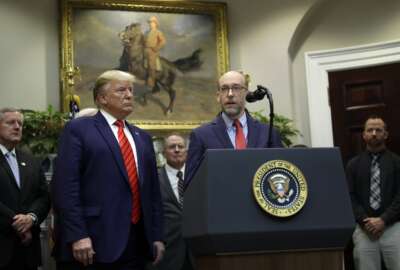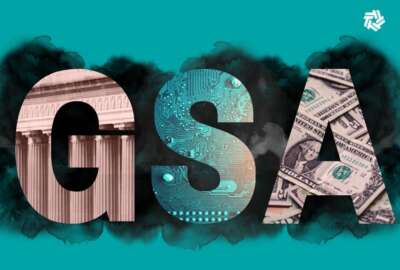Looks like no sequestration cuts will be needed this fiscal year
In today's Federal Newscast, as an alternative to Project 2025, the Partnership has created a new vision.
- The government isn’t perfect, but the Partnership for Public Service says that’s no reason to “burn it down.” As an alternative to Project 2025, the Partnership has created a new vision for what it believes will be the best path toward civil service reform and modernization. The Partnership says the Project 2025 proposals from former Trump administration officials would undermine agencies’ ability to deliver federal services. Instead, the new roadmap from the Partnership details different strategies for hiring and retaining employees, holding poor performers accountable, and developing agency leaders. (Vision for a better government - Partnership for Public Service)
- Agencies have just been tasked with big expectations to improve federal hiring, but they’re not on their own to get the work done. Alongside the new call to action to reform federal hiring, agencies got plenty of resources to help them reach the new expectations. The Office of Personnel Management offered guidance on conducting resume reviews and creating technical assessments. There are also new tools to help agencies figure out how to use data in the recruitment process. Another resource details the various hiring authorities that HR staff can use when recruiting for open positions. (Support for agency hiring improvement efforts - Office of Personnel Management)
- Potentially Thousands of contractors at HUD do not have rights as whistleblowers. Senator Charlie Grassley is pressing the Department of Housing and Urban Development about why it hasn't included anti-retaliation provisions to protect contractor whistleblowers in all of its contracts. Grassley says HUD is creating a significant gap in the agency’s ability to detect misconduct within its programs. Grassley wrote to HUD leaders after the agency's IG issued a management alert detailing the shortcomings of contracts awarded before 2013. Grassley wants HUD to answer four questions by Friday. These include the number of contracts still without clauses to give vendors whistleblower protections and details about any guidance or other documents HUD has provided vendors about their whistleblower rights since 2013. (Letter to HUD about contractor whistleblower rights - Sen. Charlie Grassley (R-Iowa))
- Rest easy federal financial managers, you've made it another year where budget cuts due to sequestration will not be necessary. The Congressional Budget Office says agencies will not spend more than the discretionary budget caps detailed in the Fiscal Responsibility Act of 2023. While OMB has the final say, CBO says all signs point to total discretionary spending coming at or below the 1 point 5 trillion dollar cap. OMB said in April that it also didn't think sequestration would be necessary for fiscal 2024. OMB is expected to send its final sequestration report to Congress later this month.(Sequestration update report: August 2024 - Congressional Budget Office)
- A General Services Administration watchdog is flagging fire safety and accessibility concerns at the agency’s headquarters. The inspector general’s office finds some of the fire doors to access stairwells in an emergency evacuation didn’t comply with fire protection requirements. The IG also found some parts of the headquarters building may be hard for people with disabilities to access. That includes wheelchair-accessible restrooms, an elevator, and handrails for the building’s wheelchair ramp. GSA officials agreed with the IG recommendations and planned to implement them. (Fire Safety and Accessibility Deficiencies at the GSA Headquarters Building in Washington, D.C. - General Services Administration Office of Inspector General)
- Scores of House lawmakers are calling on the Postal Service to adopt stricter workplace protections for extreme heat. More than 70 House lawmakers are calling on USPS to “immediately implement” a workplace heat rule that the Occupational Safety and Health Administration (OSHA) proposed last month. Lawmakers are calling on USPS to get an early start on the proposed rule, because five of its employees have died in heat-related incidents since 2018. The most recent death happened in June. USPS employees experienced more than 1,300 heat-related incidents since fiscal 2022. The inspector general office says more than half of those cases led to missed work time and potential injuries — such as heat exhaustion or heat stroke. (77 House lawmakers press USPS to adopt stricter extreme heat protections for employees - Federal News Network)
- The Army is phasing out its oldest accounting systems. The service is currently working on divesting the Standard Financial System, or STANFINS, and the Standard Operation and Maintenance Army Research and Development System, or SOMARDS. One of the main goals during the process is to minimize the impact to end users and maintain auditability. Over two hundred systems in the Defense Department are subject to the Federal Financial Management Improvement Act, which requires the systems to capture data and record transactions properly. The DoD set a goal to modernize its financial systems by 2028.(Army to phase out two of its oldest accounting systems - Federal News Network)
- A government-backed contest proves that novel artificial intelligence systems are capable of not just detecting but patching vulnerabilities in code that underpin critical infrastructure. The DARPA AI Cyber Challenge, an initiative launched by the Defense Advanced Research Projects Agency, asked competitors to design AI systems that can secure the open-source software, which is vulnerable to cyberattacks. About 40 teams submitted their systems that were tested against a set of challenges in a sandbox environment. The top seven teams get $2 million to mature their technology before the final competition in 2025. (DARPA AI challenge showcases AI’s promise in cybersecurity - Defense Advanced Research Projects Agency)
Copyright © 2025 Federal News Network. All rights reserved. This website is not intended for users located within the European Economic Area.
Eric White
Eric White is news anchor and Federal Drive producer at Federal News Network.
Follow @FEDERALNEWSCAST






